European Commission supports citizens taking their country to court

-
 Editorial Team
Editorial Team
Share article:
The European Commission adopted new guidelines on the 28th of April to help citizens gain better and fairer access to their national courts on environmental cases. When public authorities fail to comply to European environmental laws, the public can hold them to account. These new guidelines are important for further improvement of water quality across Europe.
The guidelines clarify how individuals and associations can challenge decisions, acts and omissions by public authorities before national courts. The Juncker Commission is providing guidance to citizens for better access to national justice systems. With this guidance, national administrations are made aware of possible shortcomings in their justice systems and businesses are provided with greater clarity on what EU rights and obligations are at stake.
Eliminate obstructions
National courts have to introduce assessment criteria in order to avoid that litigation costs prevent citizens and associations taking their case to court. Member States must ensure that judicial review procedures are not prohibitively expensive. Also a clear procedure with specified time limits is required.
Empowering citizens
Karmenu Vella, Commissioner for Environment, Fisheries and Maritime Affairs, states: “The new guidance is an important step in empowering citizens to take matters such as the quality of air, water and waste management in their own hands. By bringing environmental cases to the national courts, citizens can help ensure the correct application of environmental law across the EU.”
Water legislation
The EU Court of Justice has issued a number of rulings clarifying EU requirements on access to justice in environmental matters. When it comes to water issues The Water Framework Directive, The Bathing Water Directive, the Drinking Water Directive, the Nitrates Directive and the Urban Waste Water Treatment Directive are relevant.
Discussion with Member States
The adoption of the guidelines will be followed by discussions with Member States which do not yet fully comply with their obligations, as interpreted by the EU Court of Justice. These discussions will also take place in the context of the process established through the Environmental Implementation Review.

















